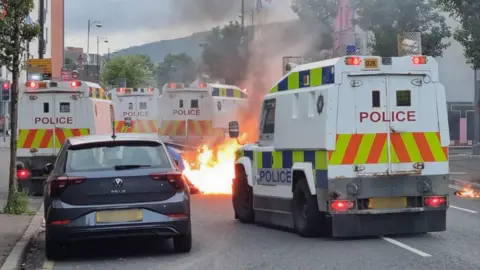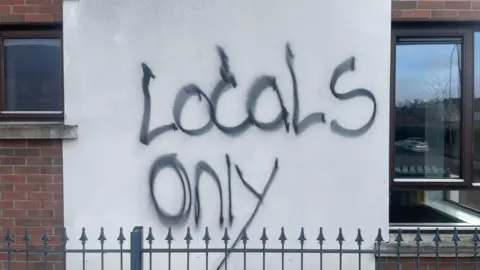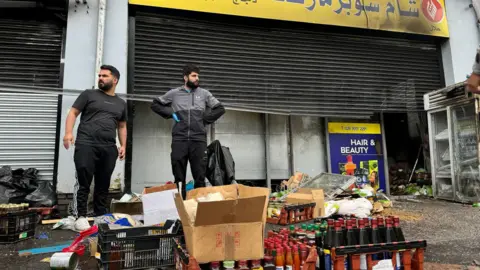'Year of hate' as race incidents and crimes on the rise in NI
 PA Media
PA MediaRace hate crimes in Northern Ireland are on the rise when compared to previous years, according to figures released by the Police Service of Northern Ireland (PSNI).
The statistics show 1,188 racially-motivated hate crimes took place, a rise of 349 on the last financial year and the highest since data was recorded in 2004.
Six of the eight highest monthly levels of racially-motivated hate incidents in the data series were recorded between May and October 2024.
Amnesty International have described the past 12 months as a "year of hate".
More than half (629) of recorded race hate crimes in the period were in Belfast.
Decrease in other hate incidents
The data is produced by the PSNI on a quarterly basis and captures incidents and crimes with a hate motivation.
Sectarian crimes saw the largest decrease, with smaller decreases in sexual orientation, disability and transgender identity crimes.
There was a decrease of 181 sectarian incidents, while the number of crimes fell by 142.

Sexual orientation incidents and crimes fell from 384 to 362 and from 241 to 219 respectively.
Disability incidents decreased from 97 to 68 and crimes fell from 57 to 40.
Transgender identity incidents fell from 68 to 63 and the number of transgender identity crimes fell from 41 to 35.
Although faith/religion incidents rose from 77 to 87 and crimes increased from 48 to 65.
August saw highest increase in race incidents
June, July and August consecutively recorded a new highest monthly level of racially-motivated incidents.
The 349 race incidents recorded in August 2024 was the single highest monthly level in the data series, around twice the previous monthly high of 171 recorded in July 2024.
It comes after racist violence hit the streets of Belfast that month.
 Pacemaker
PacemakerPSNI Ch Supt Sue-Ann Steen said the increase in racially-motivated hate crimes "is concerning" and the police force is "unequivocal" in its response.
"We will continue to police this type of criminality as robustly as the law permits and do everything in our power to bring anyone who commits a hate crime to justice.
"Prosecutions in relation to the totally unacceptable violence we saw on our streets last summer are ongoing, and I want to re-iterate the message that this behaviour will not be tolerated."
'Dismantle the toxic prejudice'
Patrick Corrigan, Amnesty International's Northern Ireland Director, said the past year has been "a year of hate for victims of racism in Northern Ireland".
"These figures should serve as a stark wake-up call for the Northern Ireland Executive," he said, adding its 10-year racial equality strategy "has failed".
"Promises made years ago remain broken, while racism has been allowed to flourish. Last year, race hate crime hit an all-time high – a shameful milestone."
As the current Racial Equality Strategy nears its expiration date, Mr Corrigan said the NI Executive "must deliver more than rhetoric".
"It must implement a bold, effective action plan to confront and dismantle the toxic prejudice that has taken root across Northern Ireland."
An independent review of the Northern Ireland Executive's Racial Equality Strategy 2015 - 2025, commissioned by the Executive and published in December 2024, found the strategy has been undermined by the lack of an action plan and budget.
'No place in our society'
The figures released by the PSNI come on the same day they are investigating a racially-motivated hate crime after a report of graffiti was painted onto the walls of an unoccupied house in the Hopewell Crescent area of north Belfast.
"There is no place in our society for this type of intimidating behaviour and we will continue to engage with local representatives and partner agencies around community safety," a spokesperson for the PSNI said.
TUV councillor Ron McDowell said: "No one should engage in acts of vandalism, including graffiti of this kind. Thankfully this was an unoccupied property and this does not seem to be an incident aimed at an individual."
However, he highlighted that residents feel there is a lack of housing in the area and that "it was only a matter of time before the sentiments of local residents found such expression, as regrettable as that may be".
A spokesperson for the Northern Ireland Housing Executive told BBC News NI that all allocations in this area - and all others across NI - are made in line with the Housing Selection Scheme.
"We work proactively with others to promote inclusivity in our estates and that is why an incident of this nature is particularly disappointing," they added.
